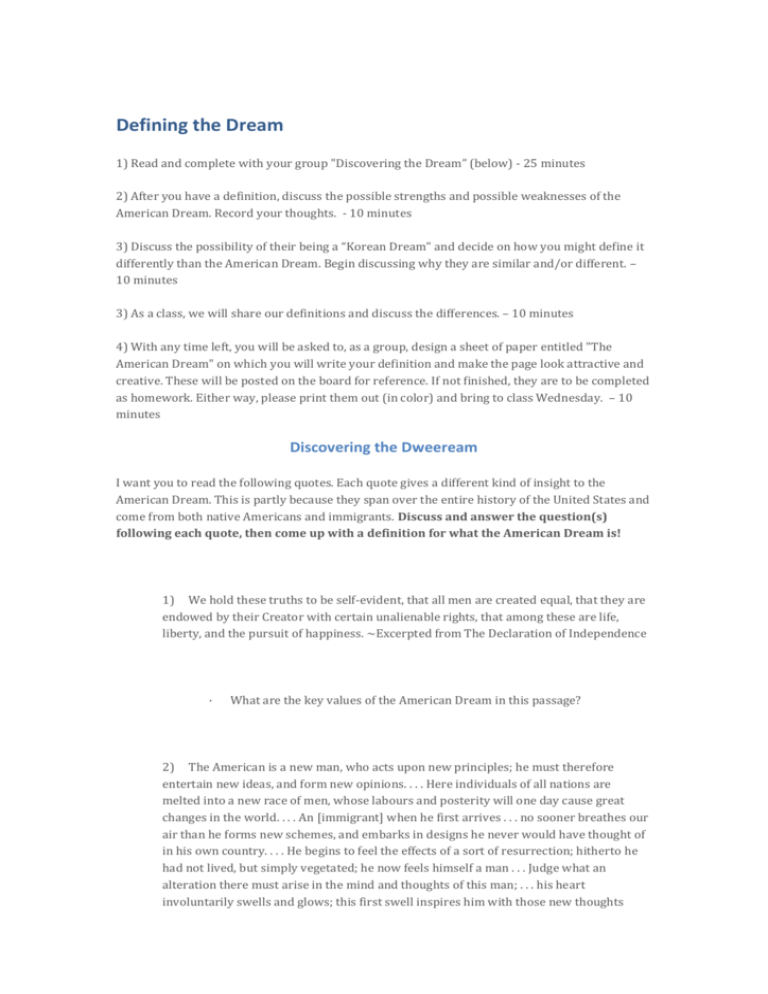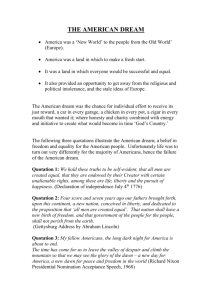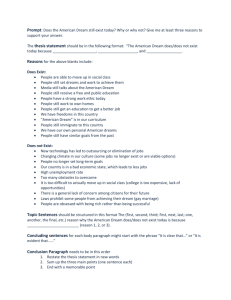What is the American Dream? - Mr. Moore Web
advertisement

Defining the Dream 1) Read and complete with your group "Discovering the Dream” (below) - 25 minutes 2) After you have a definition, discuss the possible strengths and possible weaknesses of the American Dream. Record your thoughts. - 10 minutes 3) Discuss the possibility of their being a “Korean Dream” and decide on how you might define it differently than the American Dream. Begin discussing why they are similar and/or different. – 10 minutes 3) As a class, we will share our definitions and discuss the differences. – 10 minutes 4) With any time left, you will be asked to, as a group, design a sheet of paper entitled "The American Dream" on which you will write your definition and make the page look attractive and creative. These will be posted on the board for reference. If not finished, they are to be completed as homework. Either way, please print them out (in color) and bring to class Wednesday. – 10 minutes Discovering the Dweeream I want you to read the following quotes. Each quote gives a different kind of insight to the American Dream. This is partly because they span over the entire history of the United States and come from both native Americans and immigrants. Discuss and answer the question(s) following each quote, then come up with a definition for what the American Dream is! 1) We hold these truths to be self-evident, that all men are created equal, that they are endowed by their Creator with certain unalienable rights, that among these are life, liberty, and the pursuit of happiness. ~Excerpted from The Declaration of Independence · What are the key values of the American Dream in this passage? 2) The American is a new man, who acts upon new principles; he must therefore entertain new ideas, and form new opinions. . . . Here individuals of all nations are melted into a new race of men, whose labours and posterity will one day cause great changes in the world. . . . An [immigrant] when he first arrives . . . no sooner breathes our air than he forms new schemes, and embarks in designs he never would have thought of in his own country. . . . He begins to feel the effects of a sort of resurrection; hitherto he had not lived, but simply vegetated; he now feels himself a man . . . Judge what an alteration there must arise in the mind and thoughts of this man; . . . his heart involuntarily swells and glows; this first swell inspires him with those new thoughts which constitute an American. ~Excerpted from Letters from an American Farmer, 1782, by Hector St. John de Crevecoeur · What kind of feeling to you get when you read about the “American man”? Is he a positive figure? Something you would aspire to be? Why (not)? 3) This is free ground. All the way from here to the Pacific Ocean. No man has to bow. No man born to royalty. Here we judge you by what you do, not by what your father was. Here you can be something. Here’s a place to build a home. . . It’s the idea that we all have value, you and me . . . ~ Colonel Joshua Lawrence Chamberlain, 20th Maine, as represented in the novel The Killer Angels by Michael Shaara, 1974 · What seems to be the thing that Colonel Chamberlain is willing to fight for? 4) Give me your tired, your poor, Your huddled masses yearning to be free, The wretched refuse of your teeming shore. Send these, the homeless, tempest-tost to me, I lift my lamp beside the golden door! ~ Excerpted from a poem by Emma Lazarus, 1883, inscribed on the pedestal of the Statue of Liberty · Ellis Island, where the statue of Liberty is, was once the first thing that new immigrants would see as they poured into the United States. What kind of impression do you think this poem would have on such an immigrant? Is it true? 5) America is God’s Crucible, the great Melting Pot where all the races of Europe are melting and reforming! Here you stand, good folk, think I, when I see them at Ellis Island, here you stand in your fifty groups with your fifty languages and histories . . . into the crucible with you all! God is making the American . . . the real American has not yet arrived. He is only in the crucible, I tell you: he will be the fusion of all the races. ~ Excerpted from The Melting Pot, 1909, by Israel Zangwill · Define the “American” as portrayed by Zangwill in 1909. · Do you agree with the image of America as a melting pot, or do you agree more with historian Carl Degler, who said America is like a salad bowl, where though the salad is an entity, the lettuce can still be distinguished from the onions, the tomatoes from the cabbage… Why? 6) You see for me, America is an idea. It is a stage for transformation. I felt when I came to Iowa City from Calcutta that suddenly I could be a new person . . . What America offers me is romanticism and hope . . . Suddenly, I found myself in a country where -- theoretically, anyway -- merit counts, where I could choose to discard that part of my history that I want, and invent a whole new history for myself. It's that capacity to dream and then try to pull it off, if you can. ~ Bharati Mukeriee, novelist, in an interview with Bill Moyers, 1990 How can a whole country be considered an idea? Do you agree with Mukeriee’s conception of the American dream (as an idea)? 7) The American Dream [is] one of the greatest ideas in the history of human achievement . . . It thrives today in an age when its core components of freedom and opportunity are open to more Americans than ever before. It holds a real, identifiable place in the American heart and mind, and it informs the aspirations of everyone from farmers to software developers, from detectives to bankers, from soldiers to social workers . . . It defines us as a people, even as we add to its meaning with each new chapter in our national experience and our individual actions. ~ News commentator and reporter Dan Rather, on the research behind his book The American Dream. · Evaluate Dan Rather’s statement that the American Dream defines us as a people. If this is true, then what does it really mean to be an American? What does this tell us about why people might desire to immigrate to America? 8) I still have a dream. It is deeply rooted in the American dream… I have a dream that one day on the red hills of Georgia the sons of former slaves and the sons of former slaveowners will be able to sit down together at the table of brotherhood… I have a dream that my four children will one day live in a nation where they will not be judged by the color of their skin but by the content of their character… ~ Martin Luther King Jr. 1963 · Why do you think King refers to a connection between his dream and the American Dream? Finally: in your own words (as a group), create a definition for the American Dream!






